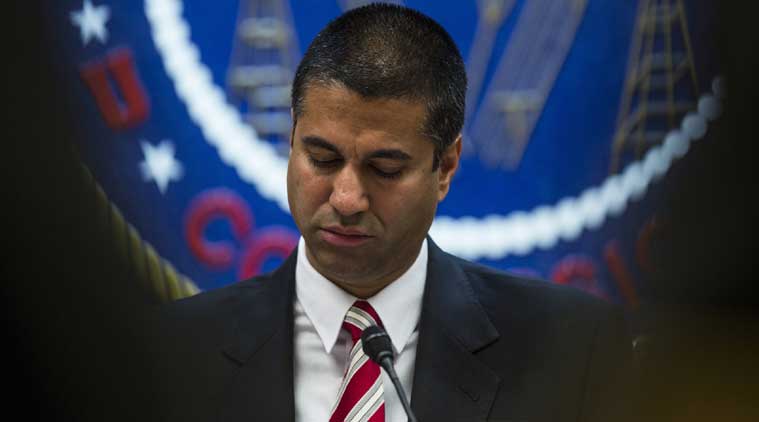Flight of Ideas
The repeal of the Open Internet Rules in America spells opportunity for other regions
 But now, thanks to FCC chairman Ajit Pai’s pig-headed move to scrap the rules, America is about to bid goodbye to all that, and will cease to be the world’s innovation leader.
But now, thanks to FCC chairman Ajit Pai’s pig-headed move to scrap the rules, America is about to bid goodbye to all that, and will cease to be the world’s innovation leader.
As was always feared — but never quite expected — the US Federal Communications Commission (FCC) has repealed the Open Internet Rules instituted by the Barack Obama administration, codifying the tradition of the open internet in the US, which fostered disruptive digital creativity and entrepreneurship. These net neutrality rules barred ISPs from discriminating against websites and apps by selectively throttling connection speeds.
They separated the connectivity business from the content and software business, encouraging each to follow its own competition curve, to the benefit of both producers and consumers. They ensured that businesses, news and social communications platforms played on a level field, and stripling startups could dream of overtaking financially powerful market leaders by the power of their ideas and innovations alone. But now, thanks to FCC chairman Ajit Pai’s pig-headed move to scrap the rules, America is about to bid goodbye to all that, and will cease to be the world’s innovation leader.
What has changed? Now, US developers would need permissions, to be bought from ISPs for cash or kind, before they could release their apps. Websites would need to pony up — or their users would need to pay a premium — to get ahead in the game. Most of the biggest brands in US computing, including Google and Apple, were launched from garages. If they were to start up now, they would have to look for the internet equivalent of High Street addresses, just to get off the blocks.
The repeal is bound to be challenged in court, because there is intense public sentiment in favour of net neutrality (the Indian community has been particularly vocal). Heavyweight URLs like Netflix, Twitter, Reddit, Amazon and Kickstarter have lobbied against Pai. So has Tim Berners-Lee, director of the W3C Consortium, the standards organisation overseeing the development of the Web. In 1983 at CERN, he wrote the HTTP protocol on which the Web was launched. Thirty-four years later, HTTP remains its logical backbone.
In a powerful appeal to reason posted on Medium.com, Berners-Lee has pointed out that in the absence of net neutrality, the Web itself may not have been born, and the internet would still mean the Unix command line. At CERN, he wrote a paper, wrote some software on its basis, let it loose in the wild and effectively, the Web was up and running. If it had happened today, he would have had to engage in business negotiations and probably put up capital before ISPs would adopt the HTTP standard on their networks.
“I want an internet where content businesses grow according to their quality, not their ability to pay to ride in the fast lane,” Berners-Lee wrote this week. “I want an internet where ideas spread because they’re inspiring, not because they chime with the views of telecoms executives. I want an internet where consumers decide what succeeds online, and where ISPs focus on providing the best connectivity.”
The FCC’s decision is so patently wrong-headed, and militates so violently against the spirit of the internet, that it is bound to be challenged in the courts. But in the interim, it represents opportunity for other regions, as the locus of digital creativity shifts away to China (which has censorship, not throttling), Europe and India. The Telecom Regulatory Authority of India has reconsidered net neutrality in the light of developments in the US, and opted to maintain the status quo. Developers and entrepreneurs here, including media players, now have a temporary edge over their peers in the US market. There is an opportunity to dream disruptively, and to think of higher things, beyond the dreadfully innovative Shankhnaads which preoccupy us now.
After a cheap and awful election campaign in Gujarat, Monday’s results are awaited. It is best to wait and see who has won. We already know who the loser is: the Election Commission, which stands accused of partiality, ineptitude and plain helplessness. Don’t know which is worse. The exit polls are out, but they are a media creation, a lucrative derivates market which benefits the promoters, and no one else. Besides, metrics based on the assumption that almost all people tell the truth are bound to be a little unreal. It’s a gross misreading of human nature, especially in the context of a secret ballot, where you are not supposed to reveal your choice.
Long after, all that will remain in public memory of the Gujarat election is a prime minister who injured his brand nationally in order to get an edge in a state election. And magic mushrooms will remain, too. Two decades after Carlos Castaneda ascended to a higher plane, they’re back with Alpesh Thakore’s allegation that the prime minister owes his complexion, if not his prowess, to regular doses of fair and lovely mushrooms. But please, the nation’s CEO has his nutritional rights. We should not grudge him a little mushroom-matar to help him recover from the excesses of the Gujarat campaign.







